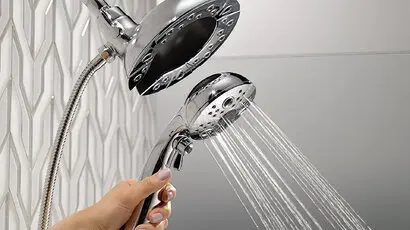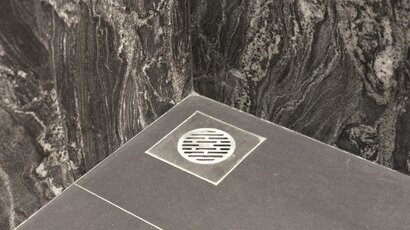Use Chemical Drain Cleaners in Showers
Discover essential safety tips for using chemical drain cleaners in showers. Understand when it’s safe, what precautions to take, and how to avoid damaging your plumbing.
Ever wonder why your once-gleaming shower has become an ankle-deep obstacle course? It’s likely a hair-raising culprit – clogged drains. We shed hair daily, and showers become battlegrounds where hair mingles with soap scum and minerals, creating a sticky, stubborn blockage.
As one woman discovered, neglecting clogged drains can lead to a nightmarish scenario. A post on the Mums Who Clean Facebook group went viral after a homeowner shared a photo of a massive hair clump retrieved from her shower drain – a build-up that went unnoticed by multiple plumbers! This story highlights the importance of proactive drain maintenance.
When faced with a stubborn shower drain clog, chemical drain cleaners can be a quick and effective solution. However, it’s important to use these powerful products safely and responsibly to avoid potential risks.
In this blog, you’ll find practical tips for safely using chemical drain cleaners in your shower. We’ll also explore alternative methods and preventive steps to help keep your drains clog-free.
Chemical drain cleaners are products formulated to help clear clogged drains by using strong chemicals to break down the blockage. Liquid drain cleaners come in various types, including acidic drain cleaners, caustic drain cleaners, and oxidising drain cleaners.
Acidic drain cleaners, like those with sulphuric or hydrochloric acid, are made to handle stubborn clogs by dissolving organic material. Caustic drain cleaners, often featuring sodium hydroxide, initiate a chemical reaction that transforms grease into a soap-like substance, effectively clearing blockages.
Oxidising drain cleaners work through strong chemicals that cause oxidation, effectively breaking down organic material in the drain.
Most chemical drain cleaners are effective at breaking down common clogs in shower drains. However, the type of drain cleaner you choose should depend on the nature of the clog and the condition of your drain pipes.
For instance, liquid chemical drain cleaners and caustic drain cleaners are ideal for hair and soap residue, while oxidising drain cleaners work well for organic matter.
Following up with hot water after using a liquid drain cleaner can be quite effective for clearing out blockages completely. It ensures the dissolved material gets flushed away properly.

For stubborn clogs or completely blocked drains, chemical cleaners might be just a temporary remedy. In such cases, a plumber’s snake or professional service might be necessary to completely resolve the issue.
If you have a septic system, be cautious, as harsh chemicals can harm septic tanks by killing beneficial bacteria. Additionally, avoid using chemical cleaners too frequently, as they can damage drain pipes, plumbing fixtures, and even kitchen sinks and bathroom drains over time.
Remember that most drain cleaners contain strong chemicals that can be harmful if not used properly. Always wear rubber gloves and eye protection when using chemical drain cleaners, and ensure proper ventilation.
Drain cleaning can involve using cold water or hot water, depending on the product’s instructions, and letting it sit overnight for maximum effectiveness. Drain cleaners work by releasing heat and causing a chemical reaction, which helps break down a drain clog, including organic matter like hair, soap scum, and even toilet paper.
However, using chemical cleaners can lead to marred kitchen fixtures or plumbing issues if not handled with care.
Reading and understanding the product label before using any liquid drain cleaner is essential to ensure safe and effective use. Each chemical drain cleaner may have different instructions regarding the amount to use, the type of drain pipe it is suitable for, and whether to use hot water or cold water.
Always keep in mind that chemical drain cleaners are not suitable for every type of clog. Tree roots, for instance, require a different approach. Additionally, excessive use of chemical cleaners can harm your plumbing system, turning a stubborn clog into a more serious plumbing issue.
If you have kitchen sinks, garbage disposals, or septic systems, it’s important to choose drain cleaners specifically made for these fixtures. Otherwise, acidic and caustic cleaners might damage metal pipes, leading to expensive repairs.
In some cases, a combination of baking soda and hot water may be a gentler alternative to chemical drain cleaners for minor clogs. However, chemical cleaners are often the go-to for a stubborn clog or completely blocked drain.

Before using a chemical drain cleaner, it’s important to prepare the area properly. Remove any standing water from the drain to allow the liquid drain cleaners to work effectively.
Clear away any objects or items near the drain to avoid accidental spills or splashes. Make sure the room is well-ventilated by opening windows or doors to reduce exposure to fumes.
When applying the chemical drain cleaner, wear essential safety gear, such as gloves, goggles, and a mask, to protect yourself from the harsh chemicals. Slowly pour the liquid drain cleaner into the drain, following the product’s instructions for the recommended amount.
Be careful not to splash the chemical cleaner, as it can cause burns or irritation.
After applying the chemical drain cleaner, allow it to sit for a specified amount of time. This waiting period is crucial for the chemical reaction to break down the clog.
Most liquid drain cleaners release heat as they work, helping to dissolve the blockage. Avoid using the drain during this time, and follow the product’s guidelines for how long to let it sit—this may range from several minutes to overnight.
Once the waiting period is over, flush the drain with hot water to clear out any remaining residue. Hot water helps wash away the loosened clog and ensures the drain is completely clear.
Check the drain to see if the water is flowing properly. If the drain is still blocked, you may need to repeat the process or consider using an alternative method, such as baking soda or a professional drain cleaning service.
Avoid using a chemical drain cleaner in combination with other products like baking soda, as this can cause unintended chemical reactions. Do not use chemical cleaners excessively, as this can damage the plumbing system, including metal pipes.
Be mindful of the type of clog you’re dealing with—chemical drain cleaners are effective for hair and grease clogs but may not work for issues like tree roots. Always follow the instructions on the product label to prevent damage to your septic tank, plumbing fixtures, or kitchen sink.
One popular alternative to chemical drain cleaners is using natural remedies like baking soda and vinegar. This combination creates a fizzy chemical reaction that can help break down minor blockages in the drain.
Pouring baking soda into the drain, followed by vinegar, can help unclog drains without the use of harsh chemicals, making it a more environmentally friendly solution.
Another effective option is using a plumber’s snake or a plunger. A plumber’s snake, also known as a drain auger, is a flexible tool that can reach deep into the drain pipe to remove the clog manually.
This method is particularly useful for stubborn clogs that chemical cleaners may not dissolve. A plunger is also an effective way to create pressure and dislodge blockages, especially for kitchen sinks or bathroom drains.
Both methods are safe for your plumbing system and do not involve the use of chemicals, making them ideal for those looking to avoid potential damage to pipes or septic tanks.
Persistent clogs can be challenging to deal with, and it might be time to call in the experts. WP Plumbing specialises in handling blocked showers and has the tools and expertise needed to ensure your shower drains remain clear and functional. Our professional team can tackle any clog, big or small, and help prevent future plumbing issues.
For reliable and effective assistance with blocked showers, reach out to WP Plumbing. Our expert services are designed to keep your plumbing system in top shape and ensure you can enjoy a hassle-free shower.
Learn when it’s crucial to schedule a drain camera inspection to identify and resolve issues within your plumbing system. From persistent clogs to unexplained water bill increases, discover how a camera inspection can help protect your property. Meta Title: How Drain Camera Inspections Can Save You Time and Money Meta
Is a strange whistling or squealing sound coming from your shower? Find out what causes it and how to fix whistling shower in our guide!
Shower drain maintenance is essential for preventing build-up, unpleasant odours, and potential blockages. Learn how frequently you should be cleaning your shower drain and the best methods to keep it clear and functioning properly.


